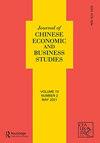From fragmented space to the Space University Institute
IF 3.7
Q2 ECONOMICS
Journal of Chinese Economic and Business Studies
Pub Date : 2022-05-26
DOI:10.1080/14765284.2022.2081486
引用次数: 1
Abstract
ABSTRACT Starting from the origin of European space policy and its institutions since WW2, this paper discusses the inconsistency of current institutional settings between the European Space Agency (ESA) and EU space policy. It points out the historical cause of this problematic situation and elaborates how it undermines potential synergies that were envisaged initially. Based on its analysis, it is proposed to open ESA up internationally, embodied in re-naming ESA to the Space University Institute (SUI), if one wants to take a parallel development to the European University Institute (EUI), or even entertaining the name International Space Agency. It would build on ESA strength in fostering research, training, and innovation while leaving the utilitarian side of downstream usage of space application to the EU. This opening up of ESA to a wider international constituency could create partnerships as they already exist within ESA with Canadafor example, and with which ESA has substantial experience.从碎片空间到太空大学研究所
摘要本文从二战以来欧洲航天政策及其机构的起源入手,探讨了欧洲航天局(ESA)与欧盟航天政策现行机构设置的不一致性。它指出了造成这一问题的历史原因,并阐述了它如何破坏最初设想的潜在协同作用。根据其分析,如果有人想与欧洲大学研究所(EUI)平行发展,甚至将国际航天局这个名字命名为国际航天局,那么就建议在国际上开放欧空局,具体体现在将欧空局更名为太空大学研究所。它将加强欧空局在促进研究、培训和创新方面的实力,同时将空间应用下游使用的实用性方面留给欧盟。欧空局向更广泛的国际选民开放,可以建立欧空局内部已经存在的伙伴关系,例如加拿大,欧空局在这方面有着丰富的经验。
本文章由计算机程序翻译,如有差异,请以英文原文为准。
求助全文
约1分钟内获得全文
求助全文

 求助内容:
求助内容: 应助结果提醒方式:
应助结果提醒方式:


